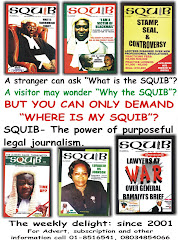THE LEARNED SQUIB
THE LURE OF TORTURE
Last week, it became my duty to visit the Pedro Police Station, Somolu. The place looked reasonably clean, almost serene too. Of course the charge room was not a tranquil sea but then it was not a place chaos chose to clash with trouble.
I was having a pleasant chat with a Senior Police Officer in his small but neat room, when I first heard the first strains of one ugly music. In the room was a third person; my client, also a lawyer. He too heard the ugly music.
The music came from some distance, less than eighty metres away. Pure, raw, ugly, loud, very loud music. It was a solo and took the form of long, drawn-out yells, moans and cries of a man in terrible pain.
Ordinarily, you won’t hear such music, without halting and turning to look in the direction of its source. But on this day, the three of us in that room, merely carried on with our conversations - as if we did not hear the music; as if it did not touch us, as if it did not move us, as if it did not affect us, as if it did not diminish our humanity. When we finished our business in the cop’s office, my client and I stepped out. Then I cast an enquiring look in my client’s face and asked;
“Did you hear that? To which he replied – “of course now. That was a suspect ‘they’ were torturing.” Then we both kept quiet, as if indifferent to the ugly reality of the strong, established culture of suspects’ torture in the Nigeria police.
But I cannot but continue to remember the ugly music, not all the time though. It comes back occasionally and I wonder who the musician was, who his audience was, when the music ended, how it ended and why it ended.
Even though suspects’ torture is illegal under our laws, it exists deeply and vastly for two main reasons - social and judicial tolerance, even support.
When police employ torture as an instrument of facilitating their work of preventing or busting crime, many citizens, except the victims and their friends and relatives, wink at the horror. People generally believe it is proper and just to brutalise criminal suspects either as a means to an end in itself (to gain vital information) or as an end in itself (punishment for commiting crime). Accordingly it only serves a thief or a pick - pocket right if the police flays him with a sjambok for being caught or for refusing to cooperate “quickly and quietly” with the police or any other captor to give out the names of his accomplices, mode of operation etc.
Where the police is loath to apply strong arm tactics on a suspect, the average complainant would suggest and encourage the use. “Oga Police” they say, show am pepper then he go talk fast, fast.’
The second, and more effective support for the use of torture by the Police comes from the judiciary. From my experience, judges and magistrates, rarely rule in favour of accused persons in trial within-trials contests over voluntariness or otherwise of extra judicial statements of suspects to the police. I will place the ratio of success of prosecutors in TWT contests at 95%, whereas in reality, confessional statements especially in violent crimes such as robbery and armed robbery made voluntarily will amount to no more than 5% or even less.
The question is why do the judiciary assist the police in continuing with the illegality of torture? I posit an answer: judges (this includes magistrates) are birds of a feather with the Nigerian Police - lovers of short cuts, shunners of propriety, haters of due process and believers in the philosophy of: “the means justifies the end.”
Nigerian judges who choose to admit involuntarily made statements, knowing same to be so made rebel against the legal order that governs their job, so as not to jeopardise the work of the police.
The police in turn too who (routinely) choose to torture criminals do so too in breach of the law, but in the belief, that in the circumstances that is the best way to save the society from criminals and their havoc. The advocates and practitioners of torture enthuse about its expedience, cheapness and quickness of results. But how really effective is torture as an instrument of fighting crime? Torture is necessarily brutal, necessarily violent, necessarily dehumanizing, how then can such a method give good yields.’ How can such an instrument produce peace and orderliness the ultimate aim of law?
Torture celebrates violence as a virtue and a solution. But violence can only breed its own kind, violence. How can a violence filled society be peaceful and orderly. May be in the real, hard and practical life of combating crime, the total elimination of torture of suspects may be not possible or realistic, but then crowning and endorsing it as the first and prime instrument of obtaining information from criminal suspects is all too wrong.
I dare say only brutes will find such endorsement appealing. Is Nigeria a nation of brutes? Judges in particular should answer this question.
Subscribe to:
Post Comments (Atom)













No comments:
Post a Comment